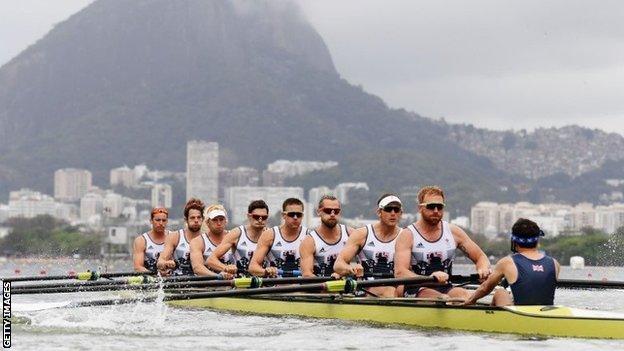Tokyo Olympics: British rower Tom Ransley retires after Games delay
- Published

Ransley (second left) won gold for Team GB in the men's eight in Rio 2016
British rower Tom Ransley, 34, was all set to be part of the men's eight defending their Olympic title in Tokyo this summer but the postponement of the Games for a year has signalled the end of his career as he announces his retirement.
My time as a rower is up. After 20 years and two Olympic medals I have come to the realisation I have nothing more to give and nothing left to gain.
I have to hang up the oar and I am coming to terms with understanding why. The rescheduling of the Tokyo Olympics to 2021 gave finality to my decision.
Rowing is a sport I never thought I loved. Yet it meant everything to me and I gave everything to it. What I once thought would be a fleeting relationship lasted two decades and it has now run its course.
Drifted ashore and run aground, I am now left rummaging through the rubble trying to make sense of the past and the future and what meaning, if any, lie in either.
A selfish and monastic existence
I chose a morning sport despite never being a morning person and loving a lie-in. This at least meant I was a glutton for punishment, which is a helpful trait in rowing.
Life in the GB rowing team revolves around the training programme, which is sent out in fortnightly instalments. We complete three training sessions a day and get every other Sunday off.
When you factor in the fatigue it does not really leave much room for anything else in life. Hence, life in the team becomes quite a selfish and monastic existence and it takes a lot of drive to stay the course and lends itself to those with an obsessive nature.
At times there is an almost cult-like tinge to the daily grind and group dynamic. It can be a pressure cooker but this drives results and a sense of belonging. When it is working well, motivation is amplified within the team, everywhere you turn you see your team-mates pushing and striving forward, extreme efforts are normalised and the group carries you on.
I am incredibly thankful for the good fortune I've had in rowing and to be welcomed into the global rowing family. I've been honoured to work with many passionate individuals and incredible teams within Team GB, as well as lining up against awesome opposition.
Tokyo swansong
Tokyo was to be my third Olympics, having won a bronze medal at London 2012, and a gold medal in the men's eight four years later at Rio 2016.
In my third Olympiad I did not have the luxury of blissful ignorance as I knew how hard an Olympic year was.
I had already lived it and breathed it, twice. I knew how deep I would need to dig within myself to produce the necessary results.
This time, however, there lurked in some dark recess of my psyche a growing niggle of doubt that something was amiss.
I feared that the Tokyo Olympics was never meant for me, and that no matter how deep I dug I would not find what I needed because it no longer existed. The fire was slowly burning out.
Whether or not I lacked the blind ferocity to see me through, struggling to get into a boat each morning is not a good place to start as a rower in the final year of an Olympiad.
I wanted to end my career at Tokyo, a simple vanity really, a wish to end the journey at the Olympics - the pinnacle of sport.
To defend our title would have made my perfect narrative arc and a fitting conclusion. However, we rarely get to choose our fate. I could not have foreseen, even a few months ago, that a global pandemic would confirm my retirement from the sport that had tested my body and mind to their absolute limits.

Ransley is looking forward to having guilt-free lie-ins
Defend the gold. Wear the flag
By the end I wasn't sure if it was my oars creaking or my spine.
In my prime, my diet consisted of an assortment of nuts, seeds, fruit, yogurt and oats for breakfast as I chased the perfect combination of carbohydrates and proteins and micro-nutrients. Recently, I sometimes have not even bothered with proper meals, and if I do it'll be something grotesquely unhealthy.
Despite these unholy habits, when the the Covid-19 pandemic dictated that the Olympics were to be postponed for a year, I did briefly catch myself day-dreaming. I dreamt of that final push, to get to Tokyo 2021.
Re-up. Start again. I can still do this. Defend the gold. Wear the flag. One. Last. Time.
Tokyo 2020 was a goal. But the goalposts have moved to Tokyo 2021 and I contemplated whether one more year would make me hungrier, would give me more time to get the body and mind tuned in or give me the versatility to even try and compete in a new boat.
It was a compelling dream, a pleasant ego-massage, a fictitious dalliance with the joy of racing. All the nice stuff, all the glory, but sadly it simply is not like that. To win an Olympics you must first destroy those dreams.
Nothing left
By the time I sat on the start line in Rio I was a machine, merely executing its function. To win is to enact a series of rehearsed procedures, it is muscle memory, and should feel like the only possible outcome. Any other result is a failure. That's why most images of the big winners show only relief. Pure escape. It is over. It is done.
A friend suggested that if you stop loving something it is impossible to give it your all, and I believe that she is right. I have used up everything I had, and I know that to get myself in the necessary condition to compete for a seat in 2021 is a step too far.
In short, I'm knackered. There's a part of me that wants to grab the metaphorical microphone and scream Wolf-of-Wall-Street-style: "I'm not leaving."
But in reality, I'm done. In the very giffable words of Ian Beale, "I've got nothing left."
So what next? My current plan extends to a reimbursement of lie-ins. After that, I would like to continue with a career involved in sport, but as a commentator or journalist.
It is time to pass the oar to the next generation of British rowers and I would love to see them win many more gold medals.